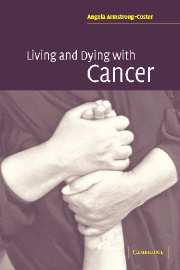4 - Stage Three – Anticipation
Published online by Cambridge University Press: 22 September 2009
Summary
Remission and recurrence
So far, we have considered how the respondents came to be drawn inexorably into the realm of the medical expert and how they were subjected to a range of high technology curative treatments. Eventually, this treatment drew to an end but as Costain Schou and Hewison observe: ‘The illness calendar [which] begins with the diagnostic period … In a sense [it] never really comes to an end – the patient will always be subject to reviews and semi-annual checks after treatment is completed’ (1999: 49) [their italics]. Being seen by others to be physically recovering well from a life threatening illness is important but, during these periods of recovery, how the respondents perceived their own progress was often in marked contrast to their external appearance. Periods of remission seemed to be marked sometimes by as much psychological turbulence as the other, more obviously dramatic, moments in their trajectory.
It may be that some primitive element of self-blame is experienced by those who have cancer (Armstrong-Coster, 2001) but, whatever the cause, the interviewees all, to varying extents, tended to play down the pain of their illness, focusing, instead, on protecting those for whom they cared. Before Kubler-Ross's (1995) critique of ‘modernist medical care’ written in 1969, individuals who were dying were tangible proof of the failure of science to cure. They were an embarrassment to the ‘experts’ of the medical profession, which at that time was virtually unchallenged in its dominance of health related matters.
- Type
- Chapter
- Information
- Living and Dying with Cancer , pp. 81 - 134Publisher: Cambridge University PressPrint publication year: 2004



